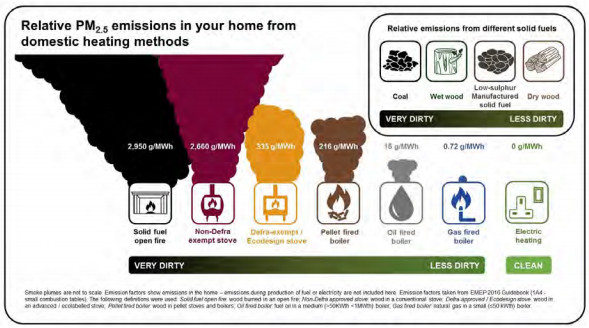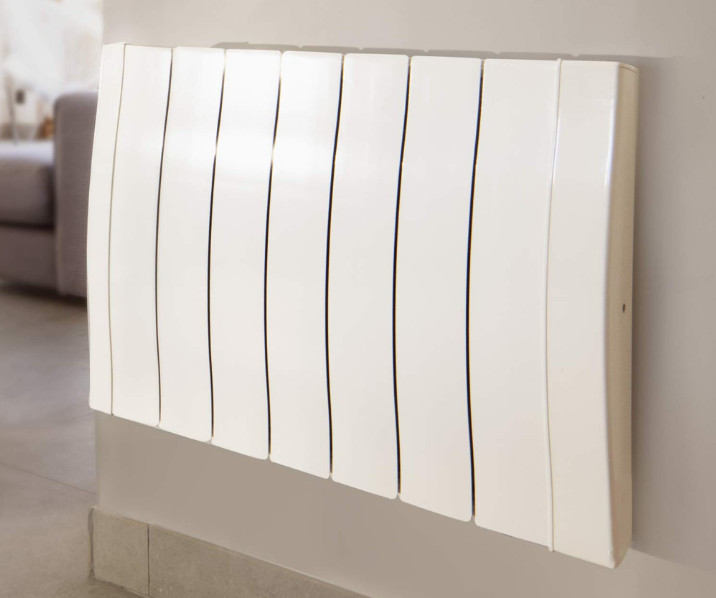Electric Radiators: The Pros and Cons
This post may contain affiliate links. At no cost to you, we earn a commission from qualifying purchases.
Home heating systems play a pivotal role in your home, and there’s plenty to consider when you’re trying to compare the options.
In this article, we’ll be looking at the pros and cons of electric radiators to give you everything you need to decide if it’s the right heating solution for you.
Electric Radiators: Pros
Let’s take a look at the plus points of electric radiators.
Efficiency and Environmental
Electric heating is 100% efficient, meaning that all energy consumed is converted into heat output.
This makes electric more efficient than central heating.
Gas boilers, which rely on combustion to create heat, produce in the process waste by-products such as CO2 and water vapour. This inefficient combustion means that less heat is created for every unit of gas, and even taking into account the most up-to-date boilers, the inherent nature of the process means that it will never be as completely efficient as electric.
Further system losses also occur through the pipework as warm water travels through the system. Not all of the heat emitted through the pipes will end up in your rooms: much of it will be lost to the walls or beneath the floor.
The recent Clean Air Strategy 2019 laid out by the Government acknowledges electric heating’s favourable impact upon the environment, relative to alternative heating methods:

Source: www.gov.uk
Electric radiators produce no carbon emissions and can be powered by electricity generated from renewable resources, making them one of the few green heating solutions on the market.
This makes electric a sustainable heating solution for the future, safeguarding it from fossil fuel scarcity as we increasingly look to renewable, eco-friendly sources.
Control
Putting in a standard programmable timer gets you 75% of the way there in terms of the potential savings.
The other 25% is about getting clever with zoning, temperature control in rooms and suchlike. Electric radiators offer intuitive management, controlled by individual thermostats within each electric radiator. This allows for ‘zoning’, which refers to the heating of separate areas within a property to different temperatures, at different times.
This is particularly useful in instances where you have a home office, for example, which will be occupied and require heating during working hours.
Other rooms during this time are likely to be unoccupied, so heating them would be a waste of both energy and money. To illustrate further, an electric radiator in your home office could be set at 19 °C between 9am and 5pm, whilst the living room could be set to 21 °C between 5pm and 10pm.
Some of the control functionalities are discussed in the video below:
Smart electric radiators such as the Haverland SmartWave go one step further, with an in-built motion sensor that triggers your heating when it detects movement within a room. When compared side by side, gas central heating is far less controllable – typically regulated by a single thermostat that engages the heating for the whole property, regardless of room occupation.
Installation
Electric radiators can be set up DIY, which makes for a quick, easy and cheap install. There’s no requirement for a qualified electrician unless you require a hardwired fitting. Electric radiators can be used wall-mounted or freestanding, to suit your space and requirements.

Wall-mounted electric radiators simply mount on the wall and plug into the nearest socket, whilst some models are available with optional easy-fit feet or casters for use free-standing. The plug-in-and-go nature of electric radiators is a far easier alternative to a central heating radiator installation.
When considering a new home heating solution, it’s important to not only consider the initial outlay, but the implementation and fitting cost too. One of the most daunting aspects of installing a new central heating system is typically the expensive and invasive plumbing work. This makes electric radiators the perfect supplementary heating system in places like extensions, that often suffer from inadequate heating.
It’s unlikely that you’ll want to interfere with fresh plasterwork to fit piping for an additional central heating radiator, but a quick DIY install of an electric radiator will fix those chilly spots with little to no effort.
Electric radiators really come into their own in conservatories, which are something of a grey area when it comes to home extensions.
These spaces specifically need heating that can be operated independently to any existing system to meet energy efficiency requirements. An electric radiator does just that – each one comes with its own in-built controls so you can have effective heating in your conservatory without the expense and labour of expanding your pipework.
Maintenance & Safety
Electric radiators require little to no maintenance.
Since they have no internal combustion elements, there’s no risk of carbon monoxide poisoning, which offers peace of mind in both domestic and commercial settings. Fuel-burning heating systems, such as gas central heating, require yearly servicing to check their functionality and safety. This must be carried out by a professional which is payable for the lifespan of the boiler.
An annual boiler service with British Gas starts from £79.30, which soon mounts up over the lifespan of the boiler, and that doesn’t account for the expense of any parts that need replacing if they don’t come up to scratch when the service is carried out.
With that said, if you’re planning on installing electric radiators as a landlord in the private rented sector, it’s important to be aware of the proposed Government regulations that will require landlords to undertake five-yearly safety checks of electrical installations in their properties.
Electric Radiators: Cons
Outages
Although uncommon in today’s modern world, power cuts are the one main weakness of electric heating, so it’s a good idea to have a portable gas heater to hand in case there’s ever an outage in your area.
As long as you have one to keep the living room nice and warm, it’s unlikely that the electricity will be cut off for long enough to make multiple back up heaters necessary, and they’re often very affordable and easy to source.
Gas central heating doesn’t come without its flaws either though, and boiler breakdowns typically have a longer turnaround time to fix because a professional engineer is always required to undertake the work.
Depending on the availability of a qualified contractor, you might even be waiting days before your boiler is fixed, which is the last thing anyone wants during a spell of cold weather. Central heating systems are not immune to power cuts either, contrary to popular belief – bear in mind that they need electricity to pump water around the pipework and to ignite gas in the boiler.
Though power cuts affect gas and electric systems alike, they can be a particularly irritating affair if you lose the saved settings on your electric radiators. With a gas system, you will most likely need to reset your programming from a central point of use, so regaining control isn’t so daunting a prospect. With electric radiators, it’s another matter. Depending on how many there are in your property, each one will need to be re-programmed individually, and in a whole-home system, this means a lot of manual effort at your expense.
There are ways around this, though.
Most electric radiators come with a backup memory which will keep your settings stored for a set period of time, even if they’re disconnected from the mains.
The best defence against losing your settings comes with the advent of smart heating, and now that many electric radiators can be controlled via an app, your programming will always be stored on your phone or tablet. So, even if your heaters lose their set program, they’ll quickly update themselves again once they re-establish connection with your smart device.
Cost
The average cost of electricity per kWh is 14.37p, and the average gas cost per kWh is 3.80p. Therefore, the baseline cost of electricity stands higher than gas. However, it’s important to consider your home heating solution as a whole – unit cost, installation, maintenance and durability.
Although the unit cost of gas makes it appear like an obvious choice, once you look at the bigger picture, gas loses some of its initial appeal, so don’t be too hasty in ruling out electric heating. Installation of gas central heating involves invasive pipework and expensive plumbing costs. Once you factor in annual servicing, repairs or any monthly fees to cover your system, any savings made from the lower unit cost quickly start to dwindle.
The Government’s Clean Growth Strategy states the need to reduce the emissions created by heating our homes and businesses, which account for almost a third of UK emissions. So, with governmental authorities having a push on cutting down on emission levels, it’s important to consider the future when planning your home heating system.
As gas central heating transmits more emissions than electric heating and the scarcity of gas as a fossil fuel being likely to cause a rise in the unit cost of gas, electric heating becomes a more attractive investment.
Mains Power Strain
Attaching multiple electric radiators to your mains can put strain on your system, depending on the wiring and room count of the house you live in. Adding a plug-in heater here or there won’t cause any issues, but if you’re looking to refit your entire property, be sure to run it by your electrician just to be sure that your mains power has adequate capacity.
To prevent overloading your system, it’s likely that you will need an electrician to hardwire your heaters into fused spurs, which should be a straightforward task for a professional.
This type of installation does come with some advantages – it offers a cleaner look with less obvious wiring and will free up plug sockets for any other appliances. Before you make a definitive decision that electric heating is for you, it’s advisable to consult a qualified electrician to discuss your project.
This article is brought to you by Electric Radiators Direct – an online retailer at the forefront of electric heating within the UK, providing the very latest in cutting-edge technology and innovative design.